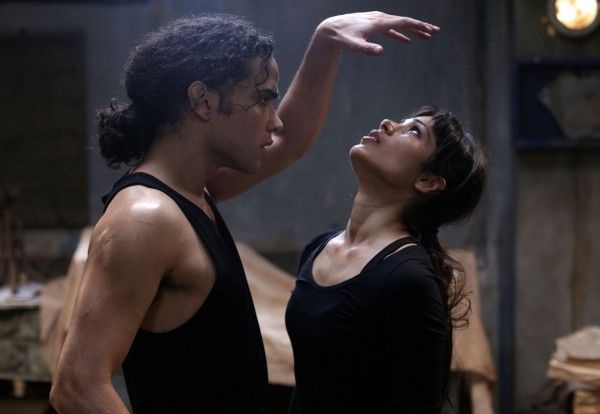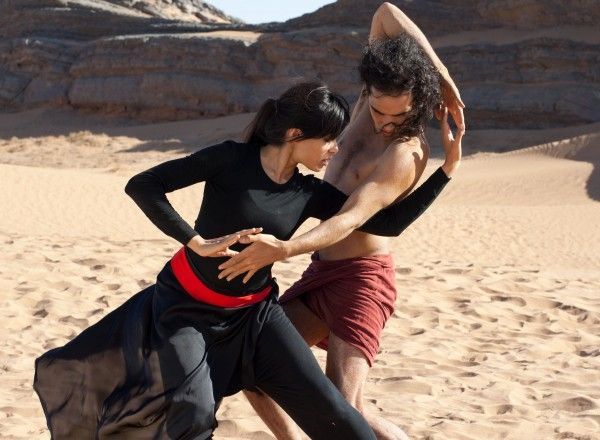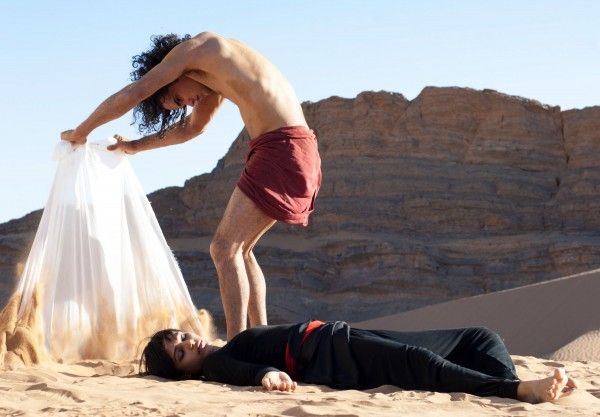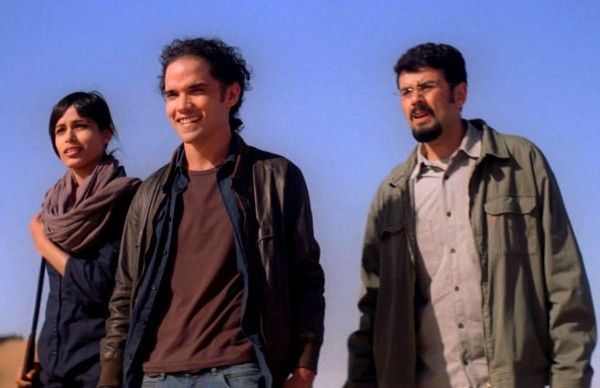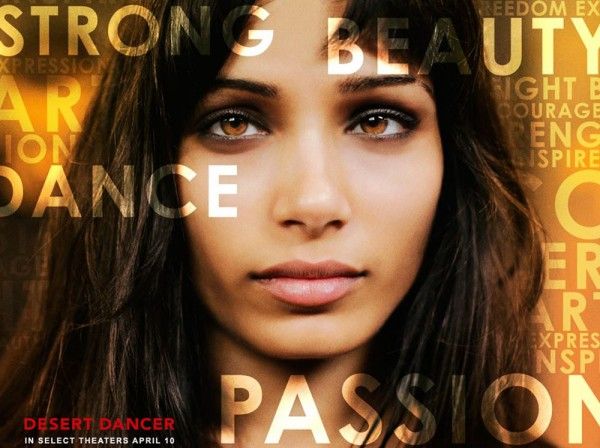Set in Tehran during the volatile climate of the 2009 presidential election, Desert Dancer follows the true story of a young man named Afshin Ghaffarian (Reece Ritchie), who just wanted the freedom to express himself through dance. Afshin and a group of dancers, including Elaheh (Freida Pinto), risk their lives by forming an underground dance company, and through performance uncover a passion for dance and one another.
During this exclusive phone interview with Collider, actress Freida Pinto talked about what drew her to this project, how all of the dance training and injuries was worth the final result, getting to meet the truly inspiring Afshin Ghaffarian, balancing the beauty and the ugliness of her character, feeling the freedom of artistic expression while making the film, and how the success of Slumdog Millionaire changed her life.
Collider: This is such an inspiring story and the dancing is so beautifully shot.
FREIDA PINTO: Oh, thank you very much. It was a lot of training and a lot of hard work and a lot of injuries, but it was all worth it. I proudly carry my battle wounds on my body because it has so much to do with the effort that I put in.
How did this come about for you?
PINTO: Actually, this film came in through my agency. Richard Raymond, the director, told me that he had to figure out how to get the film to me. It’s such an indie film, by nature, and it’s not a subject matter that’s familiar to anybody. It’s so relevant, but at the same time, when you think about Iran, do you think about dancing being forbidden or do you think about nuclear weapons? It’s really sad, but that’s what the media projects. You don’t really get to know the human side, the cultural side and the social side of it. So, Richard had to jump a few hoops to get the film into my big agency. Finally, when he got it through, my agent, who’s a big believer in independents, had it sent to me. And as soon as I read it, I was like, “When are we going to start training? I need to start now.”
This seems like it would have been such a challenging story to pull off. Did you want to talk to Richard Raymond to make sure that you were both on the same page?
PINTO: He’s a first-time director, so I had to take that meeting with him to see if our visions even matched. The way he spoke about it, the one thing that I liked the most about our conversation was that he was all about collaboration. As you know, with any form of artistic expression, it’s creative, it’s not insular. It’s all about making it a collaborative effort, and it’s all about partnership. That’s what he was looking forward to, and that’s exactly what I felt a film like this needed. It needed a bunch of young kids to come together as a group, and not only individuals. A lot of that translated to the way things were carried out on set, as well. It was always a collective decision. It was never a solo decision. And of course, Richard Raymond was the captain of the ship. He’s the director, so his was the final say. So, in many ways, it’s like running a government, just simpler and a lot more creative and less political.
What was it like to get to meet with and talk to Afshin Ghaffarian?
PINTO: When I first met Afshin, it was in Paris in 2011, at the beginning of December. I was really worried and very nervous about meeting this guy because I thought, “What if he feels like I can’t play his then girlfriend?” I wanted to make a good impression, so I did all the possible research I could about dance and dance terms, and pliés and tendus. And then, I sat down with him and realized what a waste of time that all was. All he wanted to talk about was expression. It had nothing to do with technique or knowing all those terms. It was all about, “Can you feel it? Can you really let yourself be vulnerable and strong and courageous enough to go out there and be almost childlike in wanting to access that with no boundaries and barriers?” I was like, “Oh, my god, this is not going to be one of those dance trainings that’s all about perfecting techniques and crazy antics. It’s going to be a lot deeper than what I think it’s going to be. It’s not going to be surface level training.” That’s when I realized I was really onto something. Afshin gave me so much insight into how he trained. He’s not a trained dancer. He’s never been to a dance school. He just has a passion in him, and a desire to tell a story. That’s when I realized that I need to look like the most experienced dancer of the troupe, and I will put in all the work that needs to be put into it, but I need to feel free enough to express myself. I credit Afshin for that. All the inspiration that I had, to start off with, I credit Afshin with.
There’s such a real purity and rawness to this woman, especially when you watch her dance, and there’s such a duality of the character, with the beauty of the dance mixed with the ugliness of her being a drug addict. How did you balance both of those aspects to her?
PINTO: I feel like the ugliness is just as beautiful as the beauty of seeing her gracefully move. For me to even want to play this character, I know this might sound wrong, but I had to even love the part of her drug addiction. I can’t hate it. I can’t be repelled by it, or go, “That’s disgusting. I don’t know why she does that.” I’ve got to love that part of her addictive personality, as well. Only then, can I go out there and do justice to it. So, it was not one aspect over the other. It was every aspect of her life that I dearly loved and am very protective of. I’m, in no way, trying to say that drug addiction is good. I’m just saying that, in order to play this character, as an actor, I chose to love every part of her life.
There’s a real freedom that comes from fully letting yourself go when you’re dancing. Did you get to feel that, in performing for this film?
PINTO: Absolutely! It’s changed my life. There are things that I’m always going to be afraid of and insecure about because I’m not superhuman, but in the training of this film and in mentally preparing for this character, I realized that there was one thing that I could not take with me, and that was the baggage of self-judgement. I would always have to let myself just go there. If it meant physically falling to the ground, knowing that the strength in me would break the fall, or physically letting myself go and not feeling ashamed of looking like I was a fool, that, in itself, is so liberating. The only age group of people who actually do that are children, or toddlers. Once you start getting told rules and regulations, and the norms of life and how you behave in public, that actually changes the way children behave. I had to really let myself be a 5-year-old, in order to play this character. And that’s for all of my films. I have to be able to play the character, as if I were a 5-year-old.
Slumdog Millionaire opened up a whole new world for you, as an actress. In the journey that you’ve taken with your career since then, what’s been more challenging than you expected, and what’s far surpassed what you could have imagined?
PINTO: I cannot even begin to tell you how blessed I feel that that film gives me this voice, and that I can actually take meetings or say, “I have an idea. I’m going to do this. I’m going to produce this film. I know I might not be the most famous actor on this earth, but I have this information and this knowledge. Will you listen to me?” If it wasn’t for Slumdog Millionaire, I would not have the opportunity to go out there and do that. That is a plus point. There is no negative. There is only the stuff that you work with, that works against you. You learn to work with it, and you learn to find ways and solutions around it. You meander through. There’s always a solution. That would probably be stereotypical casting. That’s the only thing that one in my position, being an ethnic minority wanting to be a part of the global storytelling phenomenon, will have to work around, but it’s not impossible. There is no impossible. There is I am possible.
Do you have any idea what you’re going to do next?
PINTO: I don’t think I can announce it, but I’m going off to do this very cool film next month. I’m just waiting for the right people to make the announcement. I’m excited about that. And I have a few films that I’m producing. Life is beautiful right now. Everything is great.
Desert Dancer is now in limited release, and opens in more theaters on April 17th.

